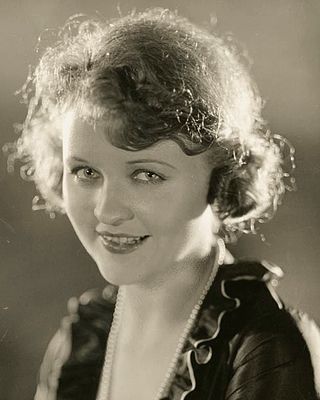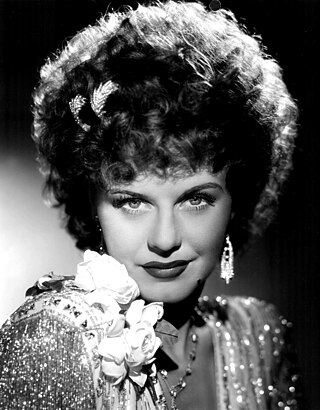
Belva Eleanora Gaertner was an American woman who was acquitted of murder in a 1924 trial. She inspired the character of Velma in the 1926 play Chicago created by Maurine Dallas Watkins; Watkins reported on the trial for the Chicago Tribune. The character of Velma Kelly also appears in the 1975 musical based on the play.
Maurine Dallas Watkins was an American playwright and screenwriter. Early in her career, she briefly worked as a journalist covering the courthouse beat for the Chicago Tribune. This experience gave her the material for her most famous piece of work, the stage play, Chicago (1926), which was eventually adapted into the 1975 Broadway musical of the same name, which was then made into a film in 2002 that won six Academy Awards, including Best Picture.

Beulah May Annan was an American suspected murderer. Her story inspired Maurine Dallas Watkins's play Chicago in 1926. The play was adapted into a 1927 silent film, a 1975 stage musical, and a 2002 movie musical, all with that title, and a 1942 romantic comedy film, Roxie Hart, named for the character who Annan inspired.

Chicago is a 2002 American musical comedy crime film based on the 1975 stage musical of the same name which in turn originated in the 1926 play of the same name. It explores the themes of celebrity, scandal, and corruption in Chicago during the Jazz Age. The film stars an ensemble cast led by Renée Zellweger, Catherine Zeta-Jones, and Richard Gere. Chicago centers on Roxie Hart (Zellweger) and Velma Kelly (Zeta-Jones), two murderers who find themselves in jail together awaiting trial in 1920s Chicago. Roxie, a housewife, and Velma, a vaudevillian, fight for the fame that will keep them from the gallows. The film marks the feature directorial debut of Rob Marshall, who also choreographed the film, and was adapted by screenwriter Bill Condon, with music by John Kander and lyrics by Fred Ebb.

Chicago is a 1975 American musical with music by John Kander, lyrics by Fred Ebb, and book by Ebb and Bob Fosse. Set in Chicago in the jazz age, the musical is based on a 1926 play of the same title by reporter Maurine Dallas Watkins, about actual criminals and crimes on which she reported. The story is a satire on corruption in the administration of criminal justice and the concept of the "celebrity criminal".

Male and Female is a 1919 American silent adventure/drama film directed by Cecil B. DeMille and starring Gloria Swanson and Thomas Meighan. Its main themes are gender relations and social class. The film is based on the 1902 J. M. Barrie play The Admirable Crichton.

Phyllis Maude Haver was an American actress of the silent film era.

The Volga Boatman is a 1926 American silent drama film directed by Cecil B. DeMille, who reportedly said the film was, "his greatest achievement in picture making". The film's budget was $479,000 and it grossed $1.27 million. The film was highly successful, turning William Boyd into matinee idol overnight.

The Phoenix Theatre is a West End theatre in the London Borough of Camden, located in Charing Cross Road. The entrances are on Phoenix Street and Charing Cross Road. The Phoenix Theatre was built on the site of a former factory and then music hall Alcazar before.

Roxie Hart is a 1942 American comedy film directed by William A. Wellman, and starring Ginger Rogers, Adolphe Menjou and George Montgomery. A film adaptation of a 1926 play Chicago by Maurine Dallas Watkins, a journalist who found inspiration in two real-life Chicago trials she had covered for the press. The play had been adapted once prior, in a 1927 silent film. In 1975, a hit stage musical premiered, and was once more adapted as the Oscar-winning 2002 musical film.

The Heart of Nora Flynn is a 1916 American silent drama film directed by Cecil B. DeMille. It stars Marie Doro in her first film for Jesse L. Lasky. Art direction for the film was done by Wilfred Buckland. It premiered on April 23, 1916 at the Strand Theatre in New York City

Don't Change Your Husband is a 1919 American silent comedy film directed by Cecil B. DeMille and starring Gloria Swanson. The film was the third of six "marriage films" directed by DeMille and the first DeMille film starring Gloria Swanson. A Chinese silent film, Don't Change Your Husband (1929), used the same English title, and a similar plot arc.

The Affairs of Anatol is a 1921 American silent comedy-drama film directed by Cecil B. DeMille, starring Wallace Reid and Gloria Swanson. The film is based on the 1893 play Anatol by Arthur Schnitzler. It was adapted by Jeanie MacPherson for the screen with assistance from Beulah Marie Dix and Elmer Harris. Art direction for the film was done by Paul Iribe.

Saturday Night is a 1922 American silent romantic comedy film directed by Cecil B. DeMille and starring Leatrice Joy, Conrad Nagel, and Edith Roberts. It was Leatrice Joy's first film with DeMille.

The Road to Yesterday is a 1925 American silent romantic drama film directed by Cecil B. DeMille. The film was based on a 1908 play of the same name by Beulah Marie Dix and Evelyn Greenleaf Sutherland and was adapted by Dix and Jeanie MacPherson. Art direction for the film was done by Paul Iribe, Anton Grot, Mitchell Leisen, and Max Parker.

Roxanne "Roxie" Hart is a fictional character. She is the main character of the 1926 play Chicago and its various remakes and derivatives.
Velma Kelly is one of the main characters in the successful 1975 Broadway musical Chicago. Kelly is based on the character "Velma", who first appeared in the 1926 play, also called Chicago, who was in-turn inspired by the life of Belva Gaertner.
Chicago is a play written by Maurine Dallas Watkins. The play, while fiction, is a satire based on two unrelated 1924 court cases involving two women, Beulah Annan and Belva Gaertner, who were both suspected and later acquitted of murder, whom Watkins had covered for the Chicago Tribune as a reporter.

The Coming of Amos is a 1925 American silent romantic drama film directed by Paul Sloane, produced by Cecil B. DeMille and distributed by his Producers Distributing Corporation. Copies of this film survive and can be found on home video and more recently on DVD.

William Flynn is a fictional character from the 1926 play Chicago, written by Maurine Dallas Watkins, and its various derivative works and remakes.

















